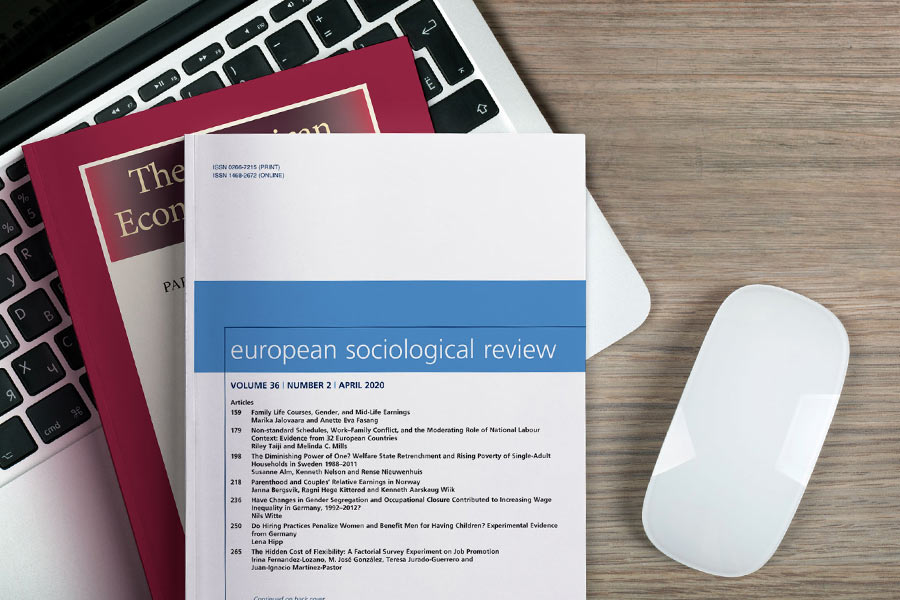Total hits 17.451
-
International migration with heterogeneous agents
Brücker, H. & Schröder, P. (2011): International migration with heterogeneous agents. Theory and evidence for Germany, 1967-2009. (Norface migration discussion paper 2011-27), London, 49 p.
-
Bestimmungsfaktoren regionaler Beschäftigungsentwicklung: Starkes Gefälle - nicht nur zwischen Ost und West
Fuchs, M. (2011): Bestimmungsfaktoren regionaler Beschäftigungsentwicklung: Starkes Gefälle - nicht nur zwischen Ost und West. In: IAB-Forum No. 2, p. 16-21. DOI:10.3278/IFO1102W016
-
Gegen den Strom: In Regionen mit geringer Arbeitsmarktdynamik entstehen unterm Strich mehr Stellen
Fuchs, M., Weyh, A. & Ludewig, O. (2011): Gegen den Strom: In Regionen mit geringer Arbeitsmarktdynamik entstehen unterm Strich mehr Stellen. In: IAB-Forum No. 2, p. 74-81. DOI:10.3278/IFO1102W074
-
Strukturmerkmale von Berufen: Einfluss auf die berufliche Mobilität von Ausbildungsabsolventen
Hoffmann, J., Damelang, A. & Schulz, F. (2011): Strukturmerkmale von Berufen: Einfluss auf die berufliche Mobilität von Ausbildungsabsolventen. (IAB-Forschungsbericht 09/2011), Nürnberg, 57 p.
-
Basic income support on probation during the employment crisis and reform discussions
Steinke, J. & Walwei, U. (2012): Bewährung der Grundsicherung in der Beschäftigungskrise und Reformdiskussion. In: W. Hanesch & H. Fukawa (Hrsg.) (2012): Das letzte Netz sozialer Sicherung in der Bewährung : ein deutsch-japanischer Vergleich, p. 293-316.
-
The selectiveness of the entrepreneurial process
Brixy, U., Sternberg, R. & Stüber, H. (2012): The selectiveness of the entrepreneurial process. In: Journal of Small Business Management : JSBM, Vol. 50, No. 1, p. 105-131. DOI:10.1111/j.1540-627X.2011.00346.x
-
Einschaltungspotenzial für den Arbeitgeber-Service der Bundesagentur für Arbeit
Müller, A., Rebien, M. & Stops, M. (2011): Einschaltungspotenzial für den Arbeitgeber-Service der Bundesagentur für Arbeit. Ergebnisse aus der IAB-Erhebung des Gesamtwirtschaftlichen Stellenangebots. (IAB-Stellungnahme 10/2011), Nürnberg, 17 p.
-
Leistungsmessung von SGB-II-Trägern: Die Bildung von Vergleichstypen trägt regionalen Unterschieden Rechnung
Blien, U., Hirschenauer, F., Kaufmann, K., Moritz, M. & Vosseler, A. (2011): Leistungsmessung von SGB-II-Trägern: Die Bildung von Vergleichstypen trägt regionalen Unterschieden Rechnung. In: IAB-Forum No. 2, p. 82-89. DOI:10.3278/IFO1102W082
-
Krise und Strukturwandel am Beispiel der Region Schweinfurt: Nach langer Flaute wieder im Aufwind
Blien, U. & Dorner, M. (2011): Krise und Strukturwandel am Beispiel der Region Schweinfurt: Nach langer Flaute wieder im Aufwind. In: IAB-Forum No. 2, p. 52-59. DOI:10.3278/IFO1102W052
-
Gestärkt aus der Krise: Ostdeutsche Regionen haben aufgeholt
Schwengler, B. & Hecht, V. (2011): Gestärkt aus der Krise: Ostdeutsche Regionen haben aufgeholt. In: IAB-Forum No. 2, p. 26-31. DOI:10.3278/IFO1102W026
-
Das Regionale Forschungsnetz sucht seinesgleichen: Ein Interview mit Stefan Fuchs und Lutz Eigenhüller
Winters, J.; Fuchs, S. & Eigenhüller, L. (interviewed person) (2011): Das Regionale Forschungsnetz sucht seinesgleichen: Ein Interview mit Stefan Fuchs und Lutz Eigenhüller. In: IAB-Forum No. 2, p. 60-65. DOI:10.3278/IFO1102W060
-
The power of money in dual-earner couples
Ludwig-Mayerhofer, W., Allmendinger, J., Hirseland, A. & Schneider, W. (2011): The power of money in dual-earner couples. A comparative study. In: Acta sociologica, Vol. 54, No. 4, p. 367-383. DOI:10.1177/0001699311422091
-
Unequal pay or unequal employment?
Arntz, M., Gregory, T. & Lehmer, F. (2011): Unequal pay or unequal employment? What drives the skill-composition of labor flows in Germany? (ZEW discussion paper 2011-074), Mannheim, 32 p.
-
Landvermessung: Regionale Unterschiede auf dem deutschen Arbeitsmarkt
(2011): Landvermessung: Regionale Unterschiede auf dem deutschen Arbeitsmarkt. In: IAB-Forum No. 2, p. 1-110. DOI:10.3278/IFO1102W
-
Beruf: Schnittstellenforscher. Porträt von Enzo Weber
Kargus, A.; Weber, E. (porträtierte Person) (2011): Beruf: Schnittstellenforscher. Porträt von Enzo Weber. In: IAB-Forum No. 2, p. 72-73.
-
The intergenerational transmission of education in East and West Germany
Riphahn, R. & Trübswetter, P. (2011): Die Veränderung der Bildungsmobilität in Ost- und Westdeutschland nach der Wiedervereinigung. In: Ifo Dresden berichtet, Vol. 18, No. 6, p. 7-13.
-
Betriebliche Aus- und Weiterbildung als Zukunftsinvestition: Eine Diagnose für vier Metropolregionen
Schwengler, B. & Bellmann, L. (2011): Betriebliche Aus- und Weiterbildung als Zukunftsinvestition: Eine Diagnose für vier Metropolregionen. In: IAB-Forum No. 2, p. 46-51. DOI:10.3278/IFO1102W046
-
Entwicklung des Arbeitskräfteangebots in Ost und West: Die Luft am Arbeitsmarkt wird für Betriebe dünner
Fuchs, J., Söhnlein, D. & Weber, B. (2011): Entwicklung des Arbeitskräfteangebots in Ost und West: Die Luft am Arbeitsmarkt wird für Betriebe dünner. In: IAB-Forum No. 2, p. 4-9. DOI:10.3278/IFO1102W004
-
Consequences of job mobility for the subsequent earnings at the beginning of the employment career in Germany and the UK
Schmelzer, P. (2011): Consequences of job mobility for the subsequent earnings at the beginning of the employment career in Germany and the UK. In: Schmollers Jahrbuch, Vol. 131, No. 2, p. 327-337.
-
Arbeitsmarkt und demografischer Wandel: Anpassungsprozesse machen dauerhaften Fachkräftemangel unwahrscheinlich
Brunow, S. & Garloff, A. (2011): Arbeitsmarkt und demografischer Wandel: Anpassungsprozesse machen dauerhaften Fachkräftemangel unwahrscheinlich. In: IAB-Forum No. 2, p. 92-97. DOI:10.3278/IFO1102W092



